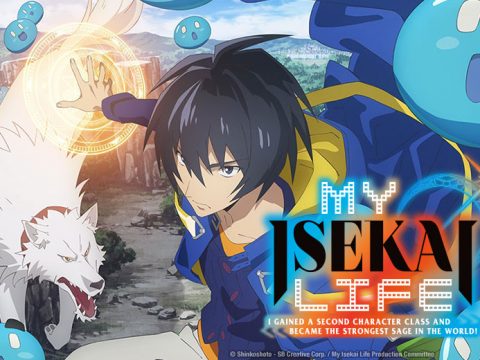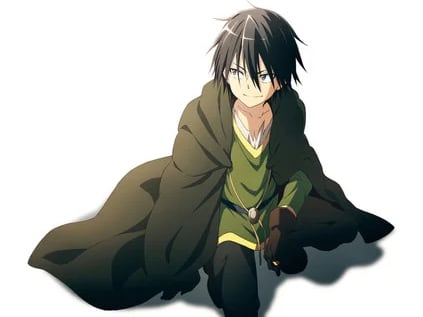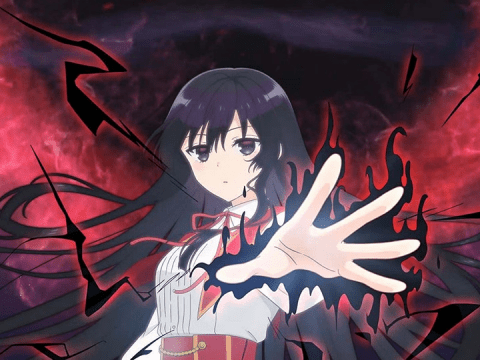Title, subtitle and premise all suggest that Grimgar: Ashes and Illusions is another negligible addition to the isekai fantasy subgenre so prominent in anime and light novels these last few years. “Grimgar” is exactly the kind of name a teenager obsessed with a particularly violent kind of power fantasy might ascribe to the ugly, brutal setting of his juvenile fantasy novel, “ashes and illusions” the pretentious subtitle he would tack on in hopes it might lend the work a philosophical, elegiac air. The central conceit is indistinguishable from the conceits of a thousand other sloppily conceived productions: a band of people from our world awake to find themselves trapped in a high-fantasy setting that operates by the rules of every generic RPG ever penned or programmed.
Details of the world and plot suggest something different. The environs of Grimgar are vibrant, lush watercolors of idyllic, countryside villages and forests that recall more the whimsical background work Shinichi Kameoka and Kouji Tsuda contributed to The Legend of Mana or even sometimes Impressionistic paintings than the drab surroundings of Overlord or the pleasant but often dull spaces of Log Horizon. Wrinkles in the plot similarly suggest something more is at work: narrator Haruhiro and fellow party members Manato, Yume, Ranta, Shihoru and Moguzo occasionally recall snippets of their past lives—words, sayings and names—only to just as quickly forget them. Though the story moves to focus on the party’s daily life and grind, these early hints occur readily enough and strike the characters so hard every time their presence suggests the central plot will concern this central mystery.
Ultimately, though, Grimgar ends up being a series concerned more with mortality and mundanity than memory. These niggling recollections become a side detail quickly enough, so much it makes one wonder why this could not have been a straight high-fantasy series. By contrast, the reality of struggle as a brutish, ugly, and omnipresent affair is marked from the end of the second episode when a fight with a goblin takes on terrifying urgency as the cast realizes it, too, is a living thing terrified of death. It’s a remarkably effective scene that simultaneously humanizes the monsters in this world in a way that will haunt the rest of the series while establishing the physical and emotional stakes that Grimgar will make so much of.
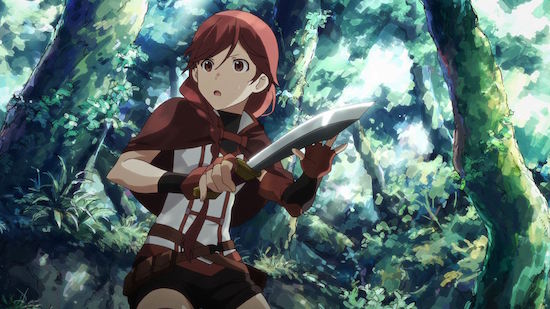
Suddenly, it is clear that theirs is a world where nothing can be taken for granted. Characters quibble about money, food, worn-out equipment and their ever-dwindling supply of resources because they know that a skipped meal or a rusty helmet could quite literally get them killed. No enemy is too minor to treat lightly: even a single skilled goblin handled foolishly is enough to push the entire party to the brink. As if to hammer home how deadly serious this narrative is, it is not explosive dramatics but carelessness and overconfidence that lead to the all-too-easily-avoidable death of a core party member which transforms the latter two-thirds of the series into a reflection on death and the grieving process. The deadly mundanity of this world is stressed not out of some slavish devotion to “reality” but to an effect that informs everything from the themes to the atmosphere of this production. Grimgar is not the only isekai story to take a psychological tack, true, but it’s by far the most grounded. Whereas, say, Re: Zero plays up psychological frustrations and revelations as adolescent apocalypse somewhat like Evangelion and .hack//sign becomes ponderous and plot-heavy, Grimgar remains sedate, sober.
For all that it is a well-considered series, though, Grimgar is maybe too well considered, too efficient. Director Ryosuke Nakamura (who handled not only series composition and direction but has his name on every episode) is exceptional when it comes to establishing story beats but lacking in expanding on them because he thinks it is enough that he makes clear what we should feel; he rarely devotes time to develop them. No sooner has a major emotional hurdle been cleared or a victory won then the series slips into a montage underscored by bubbly pop music meant to make the newly established status quo feel more permanent. This happens nearly once an episode and so, because of its frequency, ends up serving the opposite of its intended purpose: no major change feels important or permanent enough to make deep emotional impact because all such major changes come and go at the same rate. This in turn leaves the characters feeling a bit more shallow than deeper investigation reveals, which is a shame, because Grimgar’s cast is one of the more nuanced in recent memory, both as individuals and as members of a group.
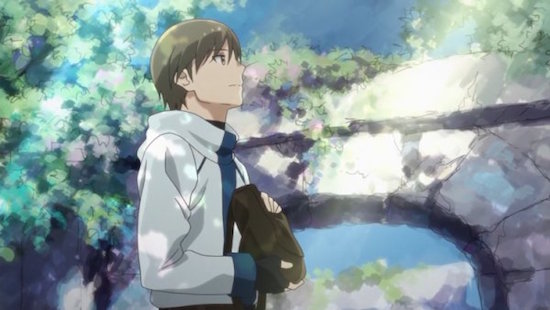
The English dub does well to retain this chemistry, but falters a bit when capturing each character’s core: Ricco Fajardo’s Haruhiro sounds more bored and strong than he does insecure, which makes his transformation into party leader over time less convincing and less moving than Yoshimasa Hosoya’s turn in the same role. Orion Pitts’ rendition of Ranta is more purely obnoxious than Hiroyuki Yoshino’s blustery take, Jeannie Tirado’s interpretation of Yume is a little too savvy from too early on to make her later maturity feel so earned. None of the actors, Japanese or English, are well served by the tacked on OVA episode exclusive to this home release that expands on hot-springs related shenanigans from the early main series, though; it was an afterthought and feels like it.
Which, ultimately, is what Grimgar at its best is a caution against. As a genuinely sensitive study of death, loss and regret, it is one of the rare series in recent years to arrive at poignant observations on these topics by careful consideration instead of bombast or sensationalism. It fails often, yes, due to thrift and to being too quiet, but even still manages rare enough insights to demand your attention.
Distributor: Funimation
Rating: TV-14


